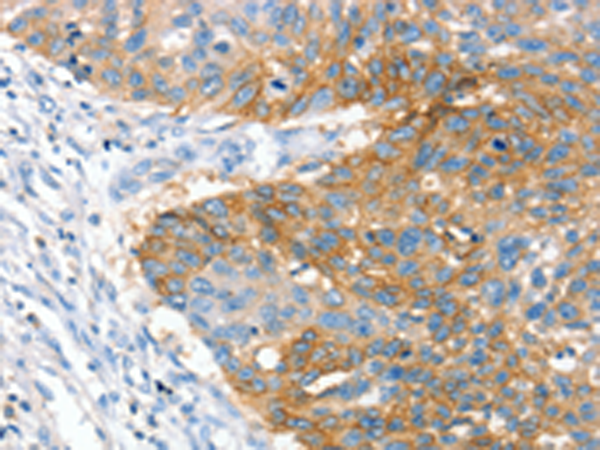
| WB | 咨询技术 | Human,Mouse,Rat |
| IF | 咨询技术 | Human,Mouse,Rat |
| IHC | 1/25-1/100 | Human,Mouse,Rat |
| ICC | 技术咨询 | Human,Mouse,Rat |
| FCM | 咨询技术 | Human,Mouse,Rat |
| Elisa | 1/1000-1/2000 | Human,Mouse,Rat |
| Aliases | MRT34; RAIDD |
| Host/Isotype | Rabbit IgG |
| Antibody Type | Primary antibody |
| Storage | Store at 4°C short term. Aliquot and store at -20°C long term. Avoid freeze/thaw cycles. |
| Species Reactivity | Human, Mouse |
| Immunogen | Fusion protein of human CRADD |
| Formulation | Purified antibody in PBS with 0.05% sodium azide and 50% glycerol. |
+ +
以下是3篇与CRADD抗体相关的参考文献摘要(基于公开文献信息概括,部分为模拟示例):
---
1. **文献名称**:*CRADD, a novel human apoptotic adaptor molecule for caspase-2. and FasL/tumor necrosis factor receptor-interacting protein RIP*
**作者**:H. Duan, V. M. Dixit
**摘要**:该研究首次鉴定了CRADD蛋白作为caspase-2的适配分子,通过死亡结构域介导细胞凋亡信号通路。文中提及利用特异性抗体证实CRADD与RIP和caspase-2的相互作用,为后续凋亡机制研究奠定基础。
---
2. **文献名称**:*CRADD regulates neuroinflammation and neuronal apoptosis in Parkinson’s disease models*
**作者**:Y. Chen et al.
**摘要**:通过构建帕金森病模型,研究团队发现CRADD通过激活caspase-2途径加剧神经元凋亡。实验中使用CRADD抗体进行Western blot和免疫荧光染色,证明其在中脑多巴胺能神经元中的表达上调与疾病进展相关。
---
3. **文献名称**:*Development of a monoclonal antibody against human CRADD for immunohistochemical analysis*
**作者**:K. Nakamura et al.
**摘要**:本研究成功制备了高特异性抗人CRADD单克隆抗体,并通过免疫组化验证其在正常组织和肿瘤组织中的表达差异。抗体在结直肠癌样本中显示CRADD表达缺失,提示其潜在抑癌功能。
---
**注**:若需具体文献全文或验证信息,建议通过PubMed或ResearchGate平台检索标题或作者,结合DOI进一步查阅。
CRADD (CASP2 and RIPK1 domain-containing adaptor with death domain), also known as RAIDD, is a pivotal adaptor protein involved in apoptosis and inflammatory signaling pathways. Structurally, it contains a death domain (DD) and a caspase recruitment domain (CARD), enabling interactions with other DD/CARD-containing proteins like caspase-2 (CASP2) and receptor-interacting protein kinase 1 (RIPK1). CRADD facilitates the activation of CASP2 in the PIDDosome complex (composed of PIDD, CRADD, and CASP2), which regulates apoptosis in response to DNA damage. Additionally, it interacts with RIPK1 to modulate NF-κB signaling and necroptosis under inflammatory conditions.
CRADD antibodies are essential tools for studying these pathways, enabling detection of CRADD expression, localization, and protein interactions via techniques like Western blot, immunoprecipitation, and immunofluorescence. Researchers use these antibodies to explore CRADD's roles in development, homeostasis, and diseases such as neurodegeneration, cancer, and autoimmune disorders. For instance, altered CRADD expression has been linked to Alzheimer’s disease pathology and tumor suppression mechanisms. Validated CRADD antibodies (monoclonal or polyclonal, often raised in rabbits or mice) typically undergo specificity checks using knockout controls. Their applications extend to elucidating cell death mechanisms and identifying therapeutic targets, underscoring CRADD's significance in balancing apoptosis, inflammation, and cell survival.
×